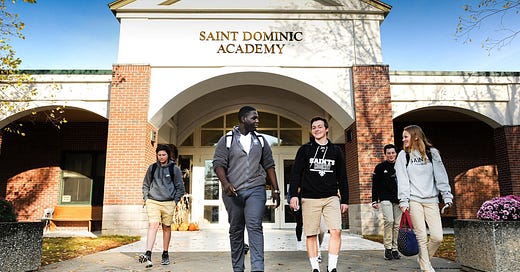Religious Schools Challenge Maine Law Excluding Them from Tuition-Assistance Program
They argue in a federal appeals court that the law violates the U.S. Constitution.

By Gary Gately
A Catholic school and another Christian school in Maine have gone to court to challenge a state law that they say excludes them from the state’s tuition-assistance program in violation of the U.S. Constitution.
Saint Dominic Academy, which operates two campuses in rural southern Maine, along with parents who want to send their children to the school, and Bangor Christian Schools appealed separate federal court decisions upholding the Maine law.
For four decades, Maine had excluded religious schools from the state’s tuition-assistance program, the nation’s second oldest.
But the U.S. Supreme Court ruled in 2022 that the state could not exclude religious schools from the tuition-assistance program because it offers aid to other private schools. In the 6-3 decision in Carson v. Makin, the court ruled that banning aid to students at religious schools, while providing it to those attending other private schools, violates the U.S. Constitution’s protection of the free exercise of religion by discriminating against religious people and schools. It marked the latest Supreme Court ruling in favor of religious groups.
While the high court decision was pending, however, Maine amended its Human Rights Act, which now forbids discrimination in admission and hiring based on factors including religion, sexual orientation and expression of a gender different than that assigned at birth.
Any school that participates in the tuition-assistance program and violates the non-discrimination act is subject to a $100,000 fine.
Bangor Christian Schools, the plaintiff in the original Supreme Court case, and Saint Dominic and the parents filed separate federal lawsuits last year challenging the anti-discrimination act.
But a federal district court judge let the act stand, and the two schools appealed to the U.S. First Circuit Court of Appeals in Boston.
Their appeals argue that the anti-discrimination act seeks to circumvent the Supreme Court ruling and effectively excludes religious schools in violation of the First Amendment guarantees of free exercise of religion and free speech as well as the Establishment Clause, which bars the government from making laws “respecting an establishment of religion.”
“Maine now excludes schools from the program if they engage in so-called ‘religious discrimination,’ if they refuse to allow student religious expression that contradicts the mission and message of the school, or if they refuse to toe the Human Rights Commission’s line on matters of sexual orientation, gender identity, and marriage,” attorneys representing Saint Dominic and the parents who want to send their children to the school argued in their appeal.
Adèle Keim, senior counsel at Becket, the religious liberties law firm representing Saint Dominic and the parents, said in a statement: “Now Maine wants to have bureaucrats in Augusta tell Saint Dominic how Catholic it can be. Maine should drop its newest effort to ‘end run’ the Supreme Court and let Saint Dominic get back to serving the Maine families that need it most.”
The Catholic parents, Keith and Valori Radonis, added in a statement released by Becket: “As Catholics, we want to raise our children in an environment that teaches them to put their faith at the heart of everything they do. Unfortunately, Maine is cheating us of this choice by cutting faith-based schools out of Maine’s tuition program. We pray the court puts an end to this exclusion once and for all.”
Maine Attorney General Aaron Frey has vigorously defended the state’s policies, arguing that public funds should not be used to support institutions that engage in practices the state considers discriminatory.
Immediately after the Supreme Court’s Carson v. Makin decision, Frey said in a statement: “The education provided by the schools at issue here is inimical to a public education. They promote a single religion to the exclusion of all others, refuse to admit gay and transgender children, and openly discriminate in hiring teachers and staff. One school teaches children that the husband is to be the leader of the household.
“While parents have the right to send their children to such schools, it is disturbing that the Supreme Court found that parents also have the right to force the public to pay for an education that is fundamentally at odds with values we hold dear.”
The American Civil Liberties of Maine and Americans United for Separation of Church and State filed briefs supporting Maine. The briefs argued that private religious schools that receive public funds cannot discriminate against students based on religion, sexual orientation, gender identity, disability or other protected characteristics.
“Any school that chooses to participate in a state-funded education program must comply with the same state regulations as all other participants, including the state’s anti-discrimination laws,” ACLU of Maine Legal Director Carol Garvan said in a statement. “No court has ruled that organizations can use public dollars to discriminate, and this court should not be the first.”
Some legal experts suggest that the case may ultimately end up before the Supreme Court.



